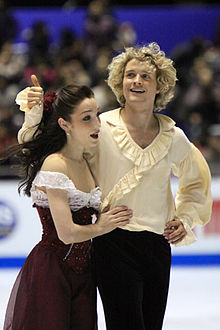Free dance (ice dance)

The free dance (FD) is a segment of an ice dance competition, the second contested. It follows the rhythm dance. Skaters perform "a creative dance program blending dance steps and movements expressing the character/rhythm(s) of the dance music chosen by the couple".[1]: p. 247 Its duration is 4 minutes for senior ice dancers, and 3.5 minutes for juniors. French ice dancers Gabriella Papadakis and Guillaume Cizeron hold the highest recorded international FD score of 123.47 points.
Background
The free dance (FD) is the second segment contested in all junior and senior ice dance competitions, after the short dance.[1]: p. 247 The 2019 U.S. Figure Skating Rulebook defines the FD as "the skating by the couple of a creative dance program blending dance steps and movements expressing the character/rhythm(s) of the dance music chosen by the couple".[1]: p. 247 It must have combinations of new or known dance steps and movements, as well as required elements.[2]: p. 141 The program must "utilize the full ice surface,"[1]: p. 247 and be well-balanced. It must contain required combinations of elements (spins, lifts, steps, and movements), and choreography that express both the characters of the competitors and the music chosen by them. It must also display the skaters' "excellent skating technique"[1]: p. 247 and creativity in expression, concept, and arrangement.[3] The FD's choreography must reflect the music's accents, nuances, and dance character, and the ice dancers must "skate primarily in time to the rhythmic beat of the music and not to the melody alone."[1]: p. 248 [note 1] For senior ice dancers, the FD must have a duration of 4 minutes; for juniors, 3.5 minutes.[3]


Gabriella Papadakis and Guillaume Cizeron hold the highest recorded international FD score of 123.47 points, which they achieved at the 2018 Winter Olympics. Papadakis and Cizeron hold the 7 highest recorded FD scores, achieved from 2016-2018. Meryl Davis and Charlie White hold 10 out of the next 21 highest scores.[4] Tessa Virtue and Scott Moir earned 124.70 points in their FD at the 2018 Canadian National Championships, the highest FD score ever recorded at the Canadian national level.[5]
Required elements
The ISU announces the specific requirements for the FD each year. For example, the ISU published the rules for the 2018–19 season in March 2018. The following elements make up a well-balanced program: the Dance Lift, the Dance Spin, the Step Sequence, Twizzles, and Choreographic Elements.[2]: p. 143 [6]: p. 1
| Elements[6]: p. 7 | Junior | Senior |
|---|---|---|
| Dance Lift | Not more than two different types of Short Lifts
or one Combination Lift |
Three different types of Short Lifts
or one Short Lift and one Combination Lift |
| Dance Spin | Not more than one Dance Spin (Spin or Combination Spin) | Not more than one Dance Spin (Spin or Combination Spin) |
| Step Sequence – Types: Straight line or Curve[note 2] | Two: one Step Sequence in Hold; one Combination One Foot Step Sequences | Two: One Step Sequence in Hold; One Combination One Foot Step Sequences |
| Synchronized Twizzles[note 3] | One Combination Set of Synchronized Twizzles | One Combination Set of Synchronized Twizzles |
| Choreographic element[note 4] | Two different Choreographic Elements chosen from:
|
Three different Choreographic Elements, One of which must be a Choreographic Character Step Sequence
Two additional chosen from:
|
Footnotes
- ^ See U.S. Figure Skating's 2019 Rulebook, and the ISU's "Special Regulations and Technical Rules", for more details about FD requirements.[1]: p. 247 [2]: pp. 141-144
- ^ The pattern of the Step Sequence must maintain the integrity or basic shape of the chosen pattern.
- ^ For both Juniors and Seniors, each partner must skate least two Twizzles, with up to a maximum of three connecting steps between Twizzles. Partners can be in hold during the connecting steps.
- ^ See ISU Communication No. 2148 for descriptions.[6]: p. 8
References
- ^ a b c d e f g "The 2019 Official U.S. Figure Skating Rulebook" (PDF). Colorado Springs, Colorado: U.S Figure Skating. June 2018. Retrieved 28 July 2018.
- ^ a b c "Special Regulations & Technical Rules Single & Pair Skating and Ice Dance 2018". International Skating Union. 2018. Retrieved 2 September 2018.
- ^ a b "Dance Format 2011" (PDF). Havířov, Czech Republic: Kraso Club of Havířov. Retrieved 29 July 2018.
- ^ "Progression of Highest Score: Ice Dance Free Dance Score". isuresults.com. International Skating Union. Retrieved 29 July 2018.
- ^ Brodie, Robert (14 January 2018). "2018 Canadian Champions Crowned". International Figure Skating. Retrieved 20 August 2018.
- ^ a b c "Communication No. 2148 Ice Dance". Lausanne, Switzerland: International Skating Union. 22 March 2018. Retrieved 29 July 2018.
